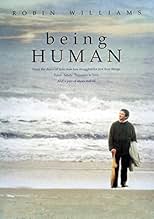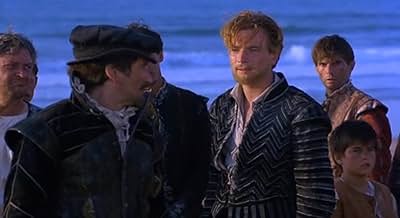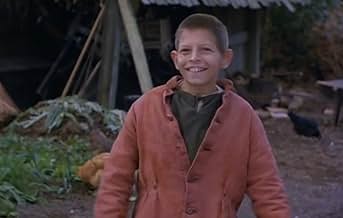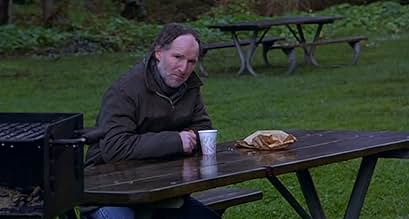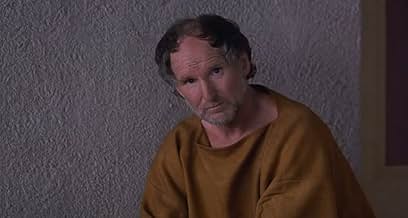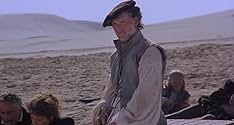Ajouter une intrigue dans votre langueA man's blunders regarding his family are told and retold through different eras in history.A man's blunders regarding his family are told and retold through different eras in history.A man's blunders regarding his family are told and retold through different eras in history.
- Raider
- (as Andy Flanagan)
Avis à la une
It's hard to fathom how he thought it would be possible for such a film to be released commercially. And while the producers presumably forked out for it without actually studying the screenplay - somehow persuaded that they should all go to Morocco to shoot some scenes on a beach and some dunes - it boggles the mind how the director and the producers managed to remain so far out of alignment on their target market, right through to the film's completion.
In any case, Warner Bros understandably couldn't market it to mainstream cinema audiences, and in a desperate attempt to salvage something, cut it severely and added a narrative voice-over to dumb it down. If anything, the surgery only made it worse. Not only has it lost its artistic integrity, it has a slapped-on narration - presumably in imitation of a bed-time story - that crops up at meaningful moments to let us know that it's a meaningful moment. The narration adds nothing, only patronises. Worse, it is incongruously done in strident tones and a raw, modern American accident. It's hard to think of a more botched attempt to salvage a film.
It's not a difficult film, but it does require some indulgence. Certainly, mainstream cinema-going viewers will only be nonplussed at having to think about what they are watching, having to tease subtleties, ambiguities, and ironies from a series of slow moving, wistful, existential stories.
Forsyth's original screenplay demanded even more indulgence, trying to extract depths of meaning out of every moment. This obsession at painting emotion is what really sinks the film - it's more literary than cinematic, and little of the attempt successfully translates to the screen. Thus, when Hector in the first story sees the boats coming in, he stands there hesitantly in full view of them and there is little sense of the absolute terror the screenplay he tells us he feels - mainly he comes across as simple-minded.
There is plenty, though, to appeal to the intelligent viewer who likes to reflect on life. The historical scenarios (except for the last segment) are interesting choices - it is rare to be taken to those times and places - some of them fairly unique. The moral or practical challenges presented to Hector each time are never boring. We like him for being hapless and benign, and we come to care for his welfare. This is excellent and engaging - for the thinking viewer - and is all the better for the straightforward technique, without any of the manipulative technology-driven tricks of modern Hollywood.
However, it's hardly an unsung masterpiece. No consistent theme emerges. Nothing really coheres into a whole. The stories needed to be much cleverer for it all to come together into a frisson of satisfaction at the end - nothing really does come together. Two of the stories have hopeful endings (if not entirely happy), the others have sad, wistful, or ambiguous endings. If there was significance in the ending of each, it was too subtle to grasp. By the last story we (might) realise that footwear seems to be a theme, though quite what the moral is there in terms of the human condition, is obscure. Other symbols, such as the windmill and the cross, if symbols they are, don't work at all, as almost everyone will miss them completely.
Worse, Hector hardly stands for the whole human race, having evolved apparently into the fashionably-sensitive liberal, the banality of which is revealed in the last story, which serves up the biggest cliché of them all: father issues, presented here with dismal earnestness as Hector bonds with his estranged children. When Hector is told that his son only needs a hug to solve everything, and his early-teen daughter gives him a little lecture on meaningful moments, I'm not sure whether my howls were of excruciation, disbelief, or disappointment.
BEING HUMAN is certainly not a movie for everyone, but it's one of the most original movies I have ever seen. The way the stories are connected is focused and it makes you think and ask the question if you might have been someone in another life in the past. Robin Williams gives one of his most straight performances of his career as the same man in different settings that has always different challenges connected to one thing. The need to return to his family. The supporting cast (Turturro, D'Onofrio, WIlliam Macy and a few others) are all pretty entertaining and the direction is very focused.
Overall, one of the most unique movies you can find and mostly recommended to folks who on occasion love seeing something different. I would also recommend to not think too much while watching, because your head might explode if you focus too much on the details and try to analyze them.
A little moody in places, the film offers reflections on what it might have been like to live at other times, as a sort of social history (no being a king or queen or royalty). The main character plays his life issues out through time, from ancient Rome, a Viking raid, a 16th or 17th century continental vagrant, to the present. Love, life's tragedies, children, and home are all themes. There is a light-heartiness to the film, and it plays on the contemporary character's life as it unfolds. Robin Williams turns in a typically great performance.
The themes and emotions all play in their times. Settings are as varied as the emotions. Sweet and sentimental, the movie captures and makes a statement about the human condition.
I appreciated the attempt to portray the ordinariness of life throughout the ages and I view the slowness of the film in this light. Life is often slow. These were interesting vignette-like character studies of one man who is never able to be completely in control of situations around him, but who perseveres.
Le saviez-vous
- AnecdotesDue to adverse reaction at preview screenings, Warner Bros instructed the director, Bill Forsyth, to trim the film by 40 minutes as well as adding narration and a happy ending. Forsyth subsequently disowned the film as a result.
- Citations
[first lines]
The Storyteller: This is the story of a story. Once upon a time there was this story, and the story said to itself, how should I begin?
Hector: Try the usual way.
The Storyteller: What, in the dark with a man and a woman, in a story that is still to tell itself?
Hector: Well, you've got to start somewhere. Say, long long ago... Or, far far away... Or, another time in a different distant country... Or just, once...
The Storyteller: That's good. "Far away", so you know the place is close to your own heart. "Once" is nice, so we know that it always happens. Hmm, Once there was this hero...
Hector: [wryly] Some hero.
The Storyteller: Some man then. Any man. Say, a man, a woman, and some children. Don't forget the children.
Meilleurs choix
- How long is Being Human?Alimenté par Alexa
Détails
- Date de sortie
- Pays d’origine
- Langues
- Aussi connu sous le nom de
- Les mille et une vies d'Hector
- Lieux de tournage
- Sociétés de production
- Voir plus de crédits d'entreprise sur IMDbPro
Box-office
- Budget
- 40 000 000 $US (estimé)
- Montant brut aux États-Unis et au Canada
- 1 519 366 $US
- Week-end de sortie aux États-Unis et au Canada
- 764 011 $US
- 8 mai 1994
- Montant brut mondial
- 1 519 366 $US
- Durée2 heures 2 minutes
- Mixage
- Rapport de forme
- 1.85 : 1
Contribuer à cette page




